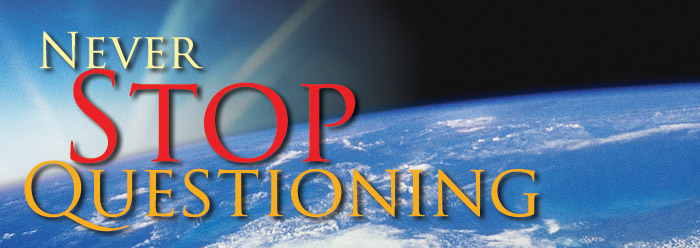

"Ask lots of questions at school. It's the best way to learn!"
That's what our parents told us every morning. And that's exactly what scientists love to do. They ask and dig and research over and over again until they're certain they've exhausted all the possibilities about the evidence in front of them.
Could you imagine if a drug company stopped asking questions about a pain medicine and its side effects on, say, children? Just because some of their scientists didn't "believe" study on children was necessary? Unthinkable!
But that's exactly what's happening in science research and teaching today. Highly qualified researchers are refusing to ask any more questions about scientific evidence, stopping halfway in their study of issues involving genetics, the solar system, the environment, and much more.
Why? Because they "believe" in one unobservable and untestable theory of scientific study and they don't want to consider any of the alternatives. Are there alternative theories in science?
Of course, and they're developed by other highly qualified scientists who have, in fact, been prevented from publishing and teaching the evidence. Unthinkable!
See for yourself. Ask the questions below and then start clicking to follow the evidence.
And NEVER STOP QUESTIONING!
 Must all scientists believe in evolution?
Must all scientists believe in evolution?
No. Science exists in two realms:
-
empirical (things that can be tested and observed)
-
historical (the unobservable past)
The theory of macroevolution (change from one kind to another) falls under historical science and relies on presuppositions based on the investigator’s beliefs about the origins of life.  Empirical science, used commonly in the investigation of diseases and the development of pharmaceutical drugs, does not employ or require evolution to conduct credible research.
Empirical science, used commonly in the investigation of diseases and the development of pharmaceutical drugs, does not employ or require evolution to conduct credible research.
Follow the evidence... Click here.
 What makes us human?
What makes us human?
All organisms react to their environments. Humans, however, are the only creatures capable of:
-
rationalization
-
moral absolutes
-
distinguishing “good and bad,” “right and wrong”
-
the drive to explore and understand
-
artistic creativity and expression
-
hunger for purpose and meaning
-
the awareness that we are aware
 Naturalistic science cannot explain the origin of these characteristics. Where did they come from?
Naturalistic science cannot explain the origin of these characteristics. Where did they come from?
Follow the evidence... Click here.
 Doesn't design in nature demand a Designer?
Doesn't design in nature demand a Designer?
The evidence of complex, carefully orchestrated design that we observe in nature suggests that a supernatural Intelligence is behind it. Just a few examples:
-
the careful balance of ecosystems
-
the intricate workings of biological “machines”
-
the unique properties of water and air and their relationship to life
-
the moon cycle and its precise effects on the earth
 As we make more scientific discoveries, we are compelled to acknowledge that the wonders of our world cannot be fully explained by naturalistic means.
As we make more scientific discoveries, we are compelled to acknowledge that the wonders of our world cannot be fully explained by naturalistic means.
Follow the evidence... Click here.
 Stifle scientific inquiry? Why?
Stifle scientific inquiry? Why?
The secular scientific community has made overt efforts to censor the work of scientists who want to explore non-evolutionary theories. It has even employed the court system in an effort to redefine science, blockade paths of inquiry, and suppress academic freedom. In its efforts to force  its own political agendas on the academic and educational communities, secular science has stifled scientific inquiry and subverted the scientific process.
its own political agendas on the academic and educational communities, secular science has stifled scientific inquiry and subverted the scientific process.
Follow the evidence... Click here.
 Is truth knowable?
Is truth knowable?
Yes—that's why we have science in the first place, to investigate and make sense of our world. Everyone, despite cultural upbringing, has a sense of what is true and not true, and the truth of something is not based upon whether or not we choose to believe it. For example, there are inescapable laws in nature that exist for our benefit and protection.  We can observe these laws in action around us and gain knowledge by what we observe. Or we can ignore them and suffer the consequences.
We can observe these laws in action around us and gain knowledge by what we observe. Or we can ignore them and suffer the consequences.
Follow the evidence... Click here.
Expelled from Texas!
Why has Texas "expelled" the only comprehensive graduate science program that evaluates the possibility of supernatural design?
Since 1981, the Institute for Creation Research Graduate School (ICRGS) has offered Master's degrees in science in the state of California. After ICR headquarters moved to Dallas, TX, the ICRGS applied in 2007 to the Texas Higher Education Coordinating Board (THECB) for a Certificate of Authority to grant degrees in Texas.
Initial reviews by a THECB evaluating team and committee gave favorable recommendations of the ICRGS program. But THECB Commissioner Raymund Paredes secretly convened an anonymous panel of secular scientists, who ruled that a program that wasn't based on evolution could not be considered "science."
With no counter testimony or rebuttal allowed from ICRGS scientists, Commissioner Paredes issued his recommendation to deny the ICRGS application, and the full Board rubber-stamped his decision.
The Graduate School of the Institute for Creation Research has been offering Master of Science degrees for 27 years. The California-based institution employs a faculty of highly credentialed men and women with stellar careers in the sciences and in education.
Yet education agency officials in the state of Texas are refusing to allow this graduate program to offer certified degrees to qualified Texas students. Why would they bar the only graduate program in the state that deals with these issues of science and education from a non-exclusionary viewpoint?
Visit Academic Freedom, and then start asking questions of Texas education officials.



